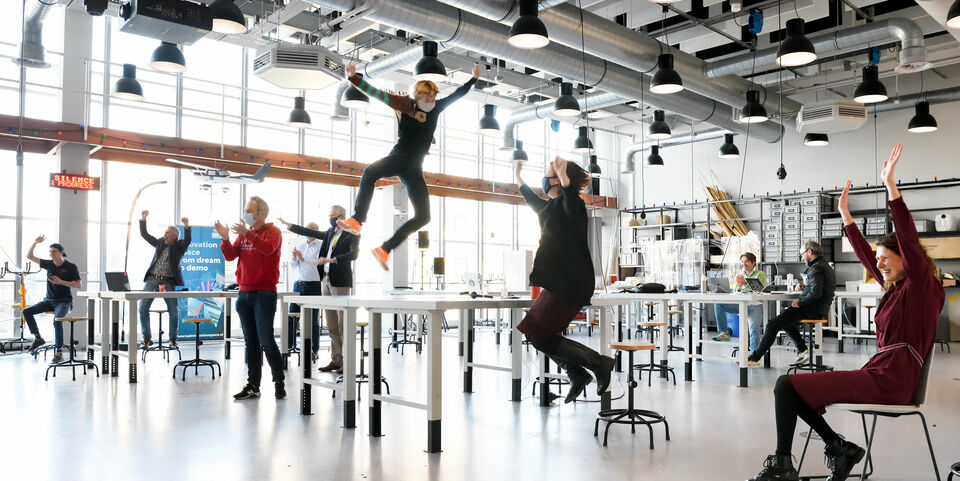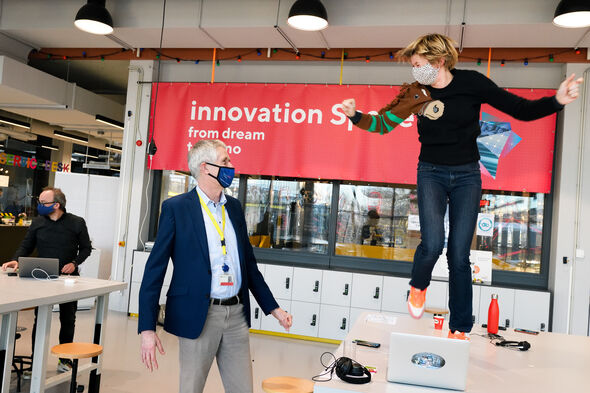Large education grant awarded to TU/e innoSpace
Lecturers at TU/e innovation Space were informed this afternoon during the online festival of the Comenius Network, a platform where educational innovators exchange experiences and ideas, that they have received a €1.2 million grant. The money will be spent on the further expansion of the learning center, where the conceptual framework for Challenge-Based Learning and its subsequent rollout is currently being investigated.
During an online ceremony this afternoon, minister of education Ingrid van Engelshoven presented three lecturer teams at research universities and three teams at universities of applied sciences with the first Dutch Higher Education Awards. TU/e innovation Space was among the nominated research university teams and received the highest grant of 1.2. million euros. The other grants are worth 800.00 and 500.000 euros respectively.
“This prize is a great recognition of the value of the educational innovation that we’ve realized here at TU/e during the past few years,” says professor Isabelle Reymen, scientific director of TU/e innovation Space. “Theeducational concept of Challenge-Based Learning is of great added value to our students. They work on concrete challenges that are closely related to their passions and that allow them to make great strides in a short period of time. We will develop this educational concept even further and we aim to apply it more widely. This prize helps us a great deal with that.”
“The Executive Board is delighted that innovation Space has gained national recognition as the most important educational innovation in Dutch academia,” rector Frank Baaijens says. “I consider this appreciation an important sign of support for educational innovations at TU/e.”
It was a deliberate choice to award the money to teams. This way, the minister wants to award and encourage collaboration in higher education. The winners can use the money for a project that contributes to innovation and improvement of higher education.
Expansion
The team from Eindhoven plans to use the €1.2 million grant for the further expansion of the learning center for the development of Challenge-Based Learning, says Alfons Bruekers, managing director of innoSpace. TU/e has already launched several experiments in the field of CBL. The aim is that in four years’ time, it will have resulted in an educational concept that can be implemented in the Bachelor College and the Graduate School.
Bruekers: “The extra money will mostly help us accelerate the development of the ICT tools we need for the further upscaling of CBL and its eventual university-wide roll out. We at innoSpace say: ‘This is a small step for man, but a giant leap for education’. You could compare this grant application to NASA’s recent successful Mars expedition. A large group of people work together towards a goal, and the outcome remains unclear up to the very last moment. We experienced such a moment here this afternoon when we were waiting if we would be awarded with the highest grant.”
Bruekers speaks of a team performance that can’t be attributed to the lecturer team at innoSpace alone. “Various groups at TU/e as well as a large number of people from the auxiliary services have contributed to this. And let’s not forget the companies from the Brainport region that provide us with the challenges’ that are so essential to this form of education.”
In the long term, innoSpace will seek collaboration outside TU/e with Fontys, Avans and Summa, as well as within the 4TU.Federation and with strategic partner institutions such as Utrecht University and University Medical Center Utrecht, Bruekers says.
The other nominated research university projects were the Urban Futures Studio from Utrecht University, and the RASL-minor from Erasmus University in collaboration with the Willem de Kooning Academy Rotterdam University of Applies Sciences and Codarts.



Discussion